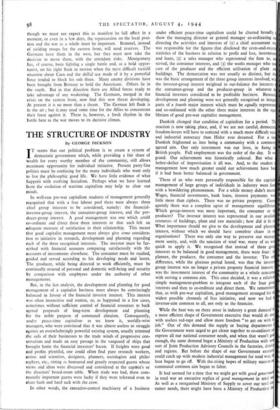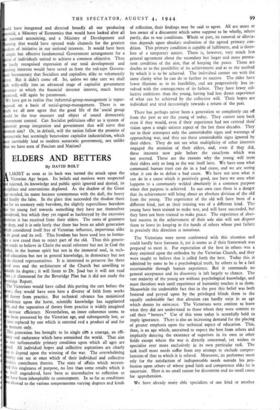THE STRUCTURE OF INDUSTRY
By GEORGE DICKSON
T seems that our political problem is to create a system of
I
. democratic government which, while providing a fair share of wealth for every worthy member of the community, still allows maximum opportunity for individual initiative. Present party-line politics must be confusing for the many individuals who want only to live the philosophic good life. We have little evidence of what happens with evolving Socialism. Perhaps what we have learned from the evolution of wartime capitalism may help to clear our minds.
In well-run pre-war capitalism students of management generally recognised that with a free labour pool there were always three chief group interests to be considered, namely: the financial- investor-group interest, the consumer-group interest, and the pro- ducer-group interest. A good management was one which could co-ordinate and direct these three interests so that each felt an adequate measure of satisfaction in their relationship. This meant that good capitalist management must always give some considera- tion to initiative in research, development and planning regarding each of the three recognised interests. The investor must be fur- nished with financial accounts comparing satisfactorily with the accounts of investments elsewhere. The consumer must be studied, guided and served according to his developing needs and tastes. The producer, while being directed to work efficiently, must be continually assured of personal and domestic well-being and security by comparison with employees under the authority of other managements.
But, in the last analysis, the development and planning for good management of a capitalist business must always be convincingly balanced in favour of the financial investor interest. This interest was often insensitive and reniote, or, as happened in a few cases, sometimes without sufficient control of financial resources to back agreed proposals of long-term development and planning for the noble purpose of communal altruism. Consequently, under peace-time capitalism as we knew it, worldly-wise managers, who were convinced that it was almost useless to struggle against an overwhelmingly powerful existing system, usually trimmed the sails of their businesses to the trade winds of progressive con- servatism and made an easy passage in the vanguard of ships that brought home the financial investors' bacon. If freights were good and profits plentiful, one could often find pure research workers, artists and scientists, designers, planners, sociologists and piffle*: 'gibers, etc., sitting as honoured and greatly respected guests whose views and ideas were discussed and considered at the captain's or the directors' board-room table. When trade was bad, these com- munally important guests were lucky if they were tolerated even to share hash and hard tack with the crew.
In other words, the executive-control machinery of a business
under efficient peace-time capitalism could be charted broadly show the managing director or general manager co-ordinating directing the activities and interests of (t) a chief accountant wI was responsible for the figures that disclosed the costs-and-recor statistics of the business in relation to profit and loss, investm and loans, (2) a sales manager who represented the firm to, served, the consumer interests, and (3) the works manager who t care of the producer and the efficient utilisation of plant buildings. The demarcation was not usually so distinct, but was the basic arrangement of the three group interests involved, wi the investor-group interest weighted to out-balance the interests the consumer-group and the producer-group in whatever financial investors considered to be profitable business. Resear development and planning were not generally recognised as irate parts of a fourth major interest which must be equally represent and co-ordinated with the other three major interests in the eq librium of good pre-war capitalist management.
Dunkirk changed that condition of capitalism for a period. reaction is now taking place, and, if we are not careful, democra freedom-lovers will have to coritend with a much more difficult s and industrial autocracy than Hitler ever dreamed. For a Dunkirk frightened us into being a community with a comma agreed aim. Our only investment was our lives, in being British people. Full employment was the order of the day. It grand. Our achievement was historically colossal. But what helter-skelter of improvisation it all was. And, to the student management how much greater could our achievement have b if it had been better balanced in government.
Those of us who were personally responsible for the cap, management of large groups of individuals in industry were fa with a bewildering phenomenon. For a while money didn't matt Wages, financial investments, bank loans, interest payments w little more than ciphers. There was no private property. Con quently there was a complete upset of management equilibri Which group-interest was most important, the consumer or producer? The investor interest was represented in our availa resources of buildings, plant and raw materials ; how did it fit i What importance should we give to the development and plane interest, without which we should have complete chaos in organisations? There was only one way to preserve our manag ment sanity, and, with the sanction of totarwar, many of us w quick to apply it. We recognised that instead of three gr interests to be balanced in good management, there were four: planner, the producer, the consumer and the investor. The o difference, while the glorious period lasted, was that the investor group interest was no longer a private property financial interest, was the investment interest of the community as a whole concern with serving a common aim. This once decided, it was a relativ simple management-problem to integrate each of the four gr interests and then to co-ordinate and direct them. We remembe that, as with pre-war capitalism, good management arranged for widest possible channels of free initiative, and now we had investor-aim common to all, not only to the financier.
While the heat was on there arose in industry a great demand a more efficient shape of Government executive that would do a with useless red-tape and allow more freedom "to get on with job." Out of this demand the supply or buying departments the Government were urged to get closer together to co-ordinate express all our national consumer needs, and when that wasn't enough, the same demand begat a Ministry of Production with sort of Joint Production Advisory Councils in the factories, distn and regions. But before the shape of our Government execu could catch up with modern industrial management for total war, heat began to go off. With the-rising hopes of military success communal common aim began to falter.
It had seemed for a time that we might get with good g in total war an executive replica of good management in total As well as a reorganised Ministry of Supply to cover our total sumer needs, there might have been a Ministry of Production
uld have integrated and directed broadly all our -producing tential, a Ministry of Economics that would have looked after all r national accounting, and a Ministry of Development and nning that would have opened wide channels for the greatest edom of initiative in our national interests. It would have been simple but effective fundamental Government arrangement for a tion of individuals united to achieve a common objective. Then freely recognised expression of our total development and nning interests would have saved us from the red-tape Govern- nt bureaucracy that Socialists and capitalists alike so vehemently test. But it didn't come off. So, unless we take care we shall lk willy-nilly into an advanced stage of capitalist government ocracy in which the financial investor interest, much better ,anised, will again be paramount.
We have got to realise that industrial-group-management is super- posed on a basis of social-group-management. There is no ubt we all now agree that the good life of the social group ould be the true measure and object of sound democratic overnment control. Can Socialist politicians offer us a system of dustrial group integration and government that will serve that mmon aim? Or, in default, will the nation follow the promise of reaucratic but seemingly benevolent capitalist industrialism, which ust inevitably lead to modern autocratic government, not unlike hat we have seen of Fascism and Nazism?



























 Previous page
Previous page